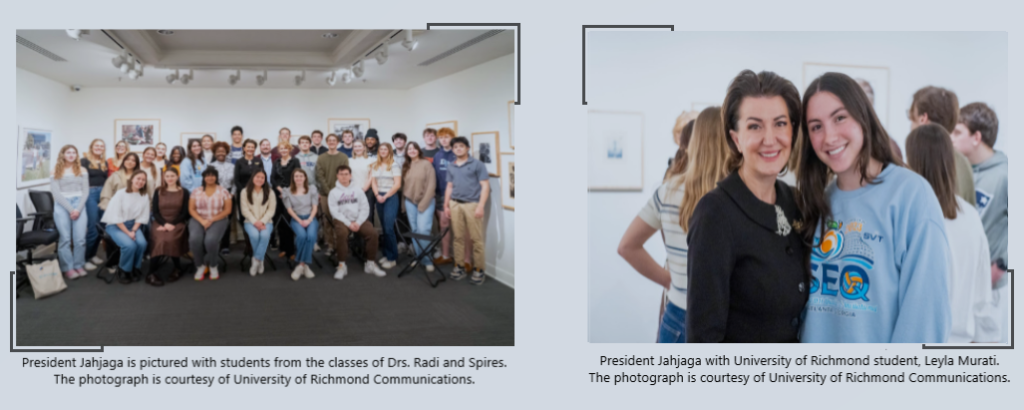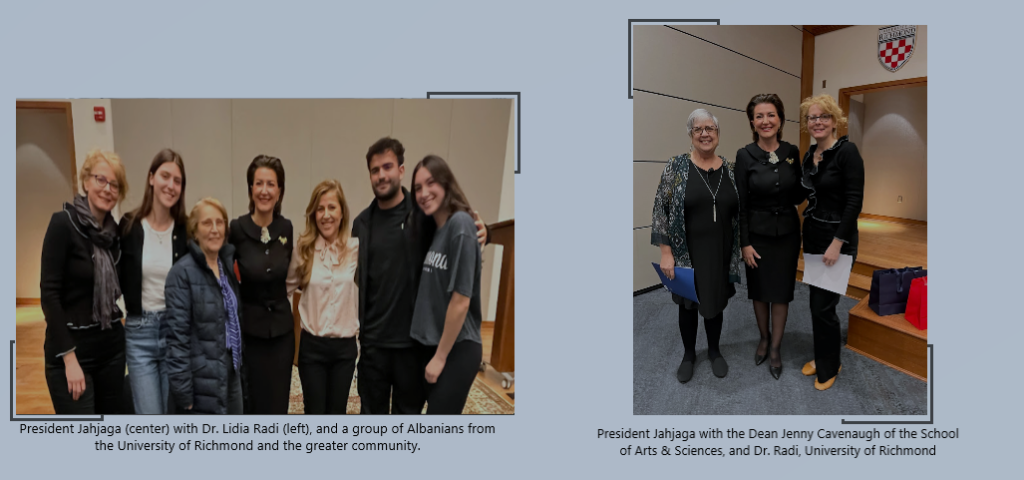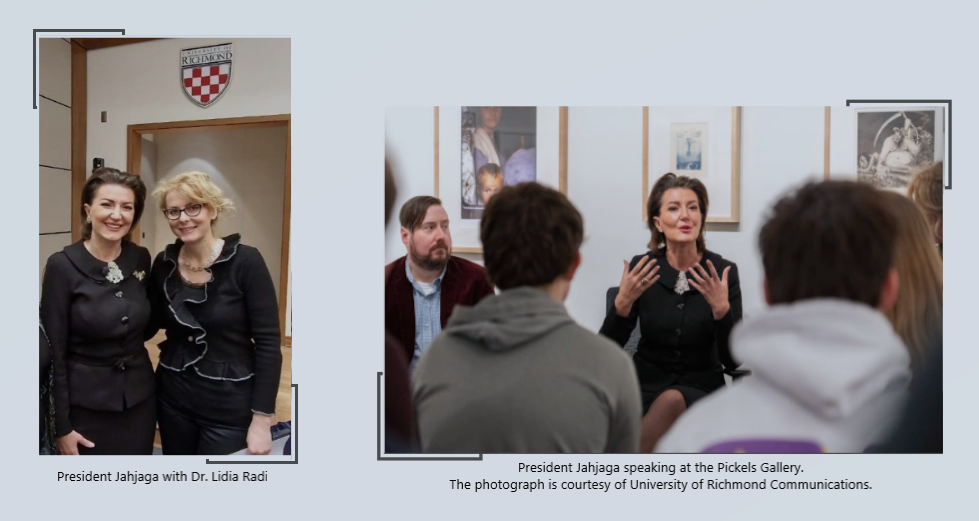


Dr. Lidia Radi, Professor, University of Richmond/
The University of Richmond in Virginia recently welcomed a distinguished guest, Ms. Atifete Jahjaga, the first female President of the Republic of Kosovo. This visit, occurring on February 26th, coincided with Kosovo’s 16th anniversary of independence, giving her presence added reflections on the country’s journey to independence.
President Jahjaga’s tenure from April 2011 to April 2016 was not only pioneering as the first female head of state in the Balkans but also established her as the youngest female world leader elected at the time. Her visit to the University of Richmond was a testament to her continued legacy of engaging with educational institutions and promoting issues of critical importance to her vision for a better world.
She engaged in informal conversations with numerous students, establishing a warm and welcoming atmosphere for her visit. After these initial interactions, the day unfolded with two important events, reflecting the significant scope of her visit and its meaningful impact.
In a personal and academic setting, President Jahjaga engaged with students from Dr. Lidia Radi’s course on “What are the liberal arts for?” and Dr. Bob Spires’s class on “Human Trafficking: Myth or Scourge”. The discussions unfolded in the atmosphere of an art gallery (Pickels Gallery) within the University of Richmond Museums, surrounded by Peter Turnley’s poignant photographs of migrants and refugees from post-war Kosovo and in conflict zones worldwide. President Jahjaga offered the students a glimpse into her own educational journey, marked by perseverance through adversity, as she recounted studying in makeshift, covert classrooms during a time of conflict in Kosovo. She also delved into the policy initiatives she championed as president, thus providing a living link between history, policy, and education.
The second event, open to the public and attended by over 200 people, saw President Jahjaga addressing a wider audience. She spoke passionately about the central tenets of her presidency – the advancement of human rights, empowerment of women, and advocacy for survivors of war. The tangible outcomes of her initiatives, including the development of policies to support equal opportunities for women and minorities as well as specific measures to aid women who were survivors of sexual violence during the war, showcased her deep commitment to these vital causes. President Jahjaga’s unwavering dedication to human rights, peace-building, and gender equality offered all attendees invaluable insights into the complex processes of post-conflict reconstruction and justice.
Leyla Murati, a student at the University of Richmond with Kosovar heritage, shared her perspective on the significance of the visit: “I was overwhelmed with joy and a sense of pride to have been able to meet the former president of the country my parents are from and that I closely identify with. It’s not every day that anyone gets to meet a world leader, but the fact that I got to meet the leader of Kosovo, a country I have visited many times and still have family in, was truly amazing and remarkable. I felt so proud, and it gave me a sense of comfort to be able to hear my language being spoken and connect to other Albanians both on campus, but also from around the Richmond area.”
Murati further highlighted the impact of President Jahjaga’s visit by adding that “the most impactful lessons I learned were that being a woman, even in male-dominated societies, does not hold you back as it’s women like President Jahjaga who break stereotypes and serve as an example for other women around the world, not just Albanian women, that you can be anything you desire as long as you truly dedicate yourself to what it is you want to do and achieve.”
Alongside President Jahjaga, Judge Remzije Istrefi from the Constitutional Court of Kosovo also visited the University of Richmond. Judge Istrefi delivered two lectures at the University of Richmond’s Law School, one on human rights and the other on transitional justice. Her insights gave students a rare, on-the-ground perspective of a post-conflict society’s legal challenges and triumphs. Her expertise offered a living context to the principles of law, illustrating their tangible impact on the rebuilding and healing of nations.
The visit by President Jahjaga, as well Judge Remzije Istrefi, to the University of Richmond was a momentous occasion for the academic community. It served as a bridge between cultures, inspiring young leaders, especially women, to diligently pursue their ambitions. It reinforced the belief that education and informed discourse are the bedrock of societal progress and democracy. President Jahjaga’s journey, marked by resilience and a commitment to advocacy, offered our students and attendees a rare and profound demonstration of how education, coupled with courage and empathy, can surmount formidable barriers and inspire tangible change.
After the visit, President Jahjaga returned to Dartmouth College, where she is currently serving as a Montgomery Fellow and a visiting professor.